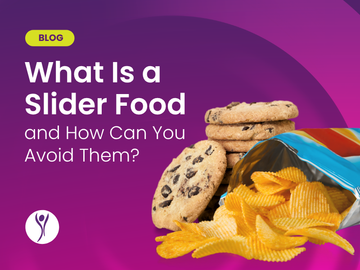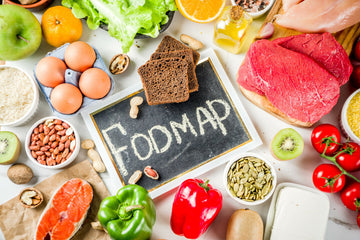by Brenda Hoehn on Oct 12, 2022

What Is a “Slider Food” and How Can You Avoid Them?
Bariatric surgery is a powerful step toward a healthier, more confident you—but like any journey, it comes with new challenges, especially around food choices. As your body adjusts and old habits try to creep back in, you might find yourself reaching for what are known as slider foods. While they may seem harmless in the moment, slider foods can slow your progress and leave you feeling frustrated. Let’s break down what slider foods are, why they matter after bariatric surgery, and how you can stay on track without feeling deprived.
What Are Slider Foods?
Slider foods are usually soft, highly processed, and high in carbohydrates—but low in real nutritional value. Because carbohydrate digestion begins right in the mouth (thanks to an enzyme called salivary amylase), these foods break down quickly and move through your smaller post-surgery stomach with ease. Just like their name suggests, slider foods slide right through your system, leaving you unsatisfied and more likely to overeat. Over time, they can make it harder to see results or may even contribute to weight regain.
Here are the most common slider foods:
- Crackers, including saltines, graham, Ritz, and others
- Popcorn
- Tortilla chips
- Potato chips
- Pretzels
- Filled cracker snacks
- Cookies
- Cakes
- Candy
Instead of relying on these quick-digesting foods, try building a routine with protein-first options that help you feel fuller longer. A high-quality protein shake can help you stay satisfied between meals without the crash.
Why Are Slider Foods Dangerous After Bariatric Surgery?
Digestion changes significantly after bariatric surgery—whether you’ve had a gastric bypass, gastric sleeve, or gastric band. When you follow a structured eating plan and start meals with protein, your smaller stomach pouch helps you feel full and satisfied. But slider foods behave differently. They pass quickly through the stomach pouch and into the jejunum, the part of the small intestine that absorbs nutrients. Because these foods digest so easily, your body stores the carbohydrates with very little effort—and without triggering the same feelings of fullness.
This can leave you feeling hungry again soon after eating, making it harder to stay on track and easier to hit a weight loss plateau. Over time, your body may also miss out on the nutrients it truly needs to thrive.
While slider foods might be comforting in the moment, they often work against your goals. You might even start questioning whether your pouch is “working,” simply because you’re not feeling full the way you expected. If you’ve been there, you’re not alone—but there are ways to get back on track with support, structure, and consistency.
To help break the cycle of cravings and support healthy digestion, consider adding tools like Metabolic G3A or a targeted probiotic to your daily routine. These products are designed to support your metabolism and gut health naturally—especially when your body is adapting post-surgery.*
Your Stomach Is a Funnel
One helpful way to think about your new stomach is to picture it like a funnel. When you eat dense, protein-rich foods—like a turkey burger or other thick-textured options—they take longer to move through your stomach. That slower digestion helps you feel full and satisfied for longer.
Slider foods, on the other hand, are more like water. They move quickly through the funnel, offering little resistance and leaving you feeling hungry soon after. The takeaway? The thicker and more protein-focused your food is, the longer it stays in your stomach—and the more supported you’ll feel between meals.
Choosing foods (and supplements) with more fiber and protein can help slow digestion and improve satiety. Try adding fiber to support regularity and help reinforce fullness between meals.
What Is Dumping Syndrome?
Another common issue some people experience after bariatric surgery is dumping syndrome, which can be uncomfortable and disruptive. This happens when certain foods—often slider foods—move too quickly from the stomach into the small intestine. Not everyone experiences dumping the same way, but symptoms can include:
- Abdominal cramping or pain
- A feeling of fullness, even if you’ve only eaten just a small amount of food
- Increased sleepiness
- Nausea or vomiting
- Severe diarrhea
- Sweating, flushing, or light-headedness
How Can You Avoid Slider Foods?
It’s completely normal to crave comfort foods after bariatric surgery—especially slider foods that go down easily. But with the right strategies, you can retrain your habits and feel more in control, without relying on willpower alone. Here are a few supportive tips to help you stay on track:
-
Stick to the basics. Start every meal with protein, then move to your veggies, and save complex carbs or healthy fats for last. Take small bites, chew thoroughly, eat slowly, and stop at the first sign of fullness. And remember the 30/30 rule if your bariatric team recommends it: avoid drinking 30 minutes before and after meals—and not during meals either.
-
Keep protein-packed snacks nearby. When hunger hits, have high-protein options ready. Hard-boiled eggs and protein shakes are convenient, satisfying swaps for slider foods. Here’s a list of some tasty high-protein snacks as well!
-
Practice before surgery, if you can. If you’re still preparing for your procedure, now is a great time to start phasing out slider foods. Begin by limiting your least favorite ones, journaling your experience, and exploring what balanced eating looks like for you.
-
Reconnect with your “why.” When cravings show up, pause and reflect on your motivation. Whether it’s improving your health, energy, or confidence—remind yourself that slider foods don’t serve your goals. Saying “no” gets easier the more you practice it.
-
Make your home a safe zone. If it’s not in the house, it’s harder to eat. Try not to bring slider foods home, or create a separate cabinet just for your post-op snacks. Over time, your environment can help reinforce your new habits.
- Move your body instead of reaching for food. If eating is your go-to during stress, try taking a walk, dancing, or stretching instead. Movement can release endorphins and shift your focus—no guilt required.
Support your hunger hormones and blood sugar with supplements. Daily support with supplements like Metabolic G3A, Fiber, or a once-daily multivitamin can help your body stay balanced, especially when navigating cravings or emotional eating.*
ProCare Health Is Here for You
You’ve come a long way on your health journey—and you don’t have to do it alone. At ProCare Health, we’re proud to offer more than just once-daily multivitamins. From fiber to protein, probiotics, and metabolic support like Metabolic G3A, our goal is to support your wellness from every angle.*
Not sure where to begin? Rely on us to find the right products for you and your unique health needs. Take our vitamin quiz to get tailored supplement recommendations just for you.
*These statements have not been evaluated by the Food and Drug Administration. This product is not intended to diagnose, treat, cure, or prevent any disease.
This blog is intended for general educational purposes only and is not a substitute for professional medical advice. Please consult your healthcare provider before making any changes to your health or wellness routine.

How the Low FODMAP Diet Is Good for Gut Health

What Is Food Noise?


